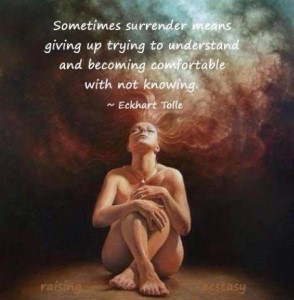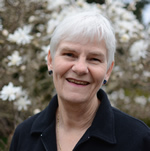 I spent the better part of 2007 in an ashram near Bangalore, India, trying to figure out how to surrender – without a lot of luck. When I returned to Canada, I did not feel much closer to even understanding what surrender meant, much less accomplishing it. Now, eight years later, from personal experience, I have a working definition and a modicum of experience and appreciation of the process. From the understanding that I have gained, I also have an appreciation – awe almost – of the healing magic that surrender can bring to one’s life. But before I get to all of that, perhaps we should explore what surrender means.
I spent the better part of 2007 in an ashram near Bangalore, India, trying to figure out how to surrender – without a lot of luck. When I returned to Canada, I did not feel much closer to even understanding what surrender meant, much less accomplishing it. Now, eight years later, from personal experience, I have a working definition and a modicum of experience and appreciation of the process. From the understanding that I have gained, I also have an appreciation – awe almost – of the healing magic that surrender can bring to one’s life. But before I get to all of that, perhaps we should explore what surrender means.
Most dictionary definitions will likely resemble this one from Webster’s: “surrender – 1. To give up possession of …2. To give up or abandon….” This is how most people view surrender – giving up. However, the type of surrender I am talking about is more of a ’letting go’. It is trusting, even when everyone around you seems to be steeped in drama and everything appears to be falling apart. It is releasing a need for a preferred outcome and simply enjoying the ride – no matter what happens.
Einstein was purportedly once asked, “What is the most important question that could be answered for mankind.” His response was, “I think the most important question facing humanity, is ‘Is the universe a friendly place?’ This is the first and most basic question all people must answer for themselves.” It seems like an odd question on the surface, but underneath it is really quite profound. If the universe is not a friendly place, then that belief will engender fear. We will feel the need to defend and protect ourselves, our possessions and our family. We will see others around us as trying to do us in, at some level.
If the universe is neither friendly nor unfriendly, then ‘God is essentially playing dice with the universe’, and we are victims of whatever happens around and to us. Life will have little seeming purpose if this is our stance. And how many of us feel we are victims of circumstance? In one moment we may feel happy if we think we are gaining, and the next, we feel despair at our losses.
However, if we decide the universe is a friendly place, then no matter what happens, we expect a silver lining. We have a knowing that everything will work out in the end. We will not feel we need to manipulate and scrabble for every piece of turf and every scrap of luck.
 It is this stance of believing in a friendly universe which gives rise to the trust that is inherent in the notion of surrender.
It is this stance of believing in a friendly universe which gives rise to the trust that is inherent in the notion of surrender.
So what is it exactly that we are trusting? What is it about a ‘friendly universe’ that we can surrender to? Or is trust simply an aspect of our inner self that can be fostered and then applied to the universe and everything in it?
The swami who ran the ashram I alluded to in the opening paragraph, told a story about surrender which has stuck with me. And before I recount the story, I should mention that India is a country with enlightenment and surrender in its very bones. It is common for men to take years from their work and their families to ‘seek enlightenment’ and nothing is thought of it. Anyway, the story goes that there was a man who decided that he wanted to surrender, but did not know who he should surrender to. He decided that he would go out onto the street and surrender to the first person he saw. The first person who came along on the street was a thief who had just committed a robbery and was in the process of fleeing the scene. The man grabbed onto the robber and told him he wanted to surrender to him. The robber tried his best to get away from the man, but the man was insistent. Finally, in desperation, the robber said to him, ‘Alright. You can surrender to me. What I want you to do is to stay right here until I get back. Close your eyes and sit here and wait. Don’t move a muscle until I return.’ And with that, the robber made his escape with his booty.
 The man felt supremely happy that he had found someone he could surrender to. He sat and waited for the robber to return. By the end of the day, the robber had not returned, but the man still stayed where he had been instructed. By the end of the second, and to the third and fourth day, the man still waited for the robber to return. As he had surrendered completely to the robber, he trusted that the robber would return, as he had said he would. At the end of the week, the man still sat with eyes closed, in total trust that the robber would return. Another week passed and although the robber still had not returned, the man still sat in complete trust and surrender. After another week passed, Lord Shiva (this was a Hindu ashram) looked down on the man and saw his plight. He saw the purity in the man’s heart and took pity on him and gave him enlightenment.
The man felt supremely happy that he had found someone he could surrender to. He sat and waited for the robber to return. By the end of the day, the robber had not returned, but the man still stayed where he had been instructed. By the end of the second, and to the third and fourth day, the man still waited for the robber to return. As he had surrendered completely to the robber, he trusted that the robber would return, as he had said he would. At the end of the week, the man still sat with eyes closed, in total trust that the robber would return. Another week passed and although the robber still had not returned, the man still sat in complete trust and surrender. After another week passed, Lord Shiva (this was a Hindu ashram) looked down on the man and saw his plight. He saw the purity in the man’s heart and took pity on him and gave him enlightenment.
The moral of the story, said the swami, was that it matters not to whom or what you surrender. The important thing is that you surrender.
I highly doubt that any aspect of the story is true, but it lends credence to the idea that surrender is an attitude – a way of being in the world. It is an attitude of complete faith and trust that everything will work out.
Lissa Rankin, MD, in her book, Mind over Medicine, cites a number of studies which show that belonging to a spiritual community, attending church and having faith in a higher power correlate to more positive emotions, a longer life expectancy and better health than those who don’t. She says, “…those who believe in a loving divinity are more likely to be happier and healthier than those who don’t…” She cited a 28 year long study conducted by the California Public Health Foundation in Alameda County which showed a strong association between attending regular religious services and lower mortality. And, “In fact, the protective effect on health…was so strong that it equaled the effect of [not] smoking and regular exercise on health.” If you have faith in a loving God, then, you believe that the universe is friendly and you can ‘surrender’ to it, rather than constantly being on guard, expecting the worst of life.
 Dr. David R. Hawkins taught a form of meditation which is characterized by continually ‘surrendering everything the moment it arises.’ Every thought, every emotion, every belief, every position. Letting go in each moment is the way to stay focused in the present. It is the supreme ‘mindfulness meditation.’ He says, “Enlightenment is not something that occurs in the future, after 50 years of sitting cross-legged and saying “OM.” It is right here, in this instant. The reason you’re not experiencing this state of total peace and timelessness is because it is being resisted. It is being resisted because you are trying to control the moment. If you let go of trying to control your experience of the moment, and if you constantly surrender it like a note of music, then you live on the crest of this exact always-ness. Experience arises like a note of music. The minute you hear a note, it’s already passing away. The instant you’ve heard it, it’s already dissolving. So every single moment is dissolving as it arises. Let go of anticipating the next moment, trying to control it, trying to hang on to the moment that has just passed. Let go clinging to what has just occurred. Let go trying to control what you think is about to occur. Then you live in an infinite space of non-time and non-event. There is an infinite peace beyond description. And you are home.”
Dr. David R. Hawkins taught a form of meditation which is characterized by continually ‘surrendering everything the moment it arises.’ Every thought, every emotion, every belief, every position. Letting go in each moment is the way to stay focused in the present. It is the supreme ‘mindfulness meditation.’ He says, “Enlightenment is not something that occurs in the future, after 50 years of sitting cross-legged and saying “OM.” It is right here, in this instant. The reason you’re not experiencing this state of total peace and timelessness is because it is being resisted. It is being resisted because you are trying to control the moment. If you let go of trying to control your experience of the moment, and if you constantly surrender it like a note of music, then you live on the crest of this exact always-ness. Experience arises like a note of music. The minute you hear a note, it’s already passing away. The instant you’ve heard it, it’s already dissolving. So every single moment is dissolving as it arises. Let go of anticipating the next moment, trying to control it, trying to hang on to the moment that has just passed. Let go clinging to what has just occurred. Let go trying to control what you think is about to occur. Then you live in an infinite space of non-time and non-event. There is an infinite peace beyond description. And you are home.”
― David R. Hawkins, Letting Go: The Pathway of Surrender
Surrender is the exact opposite of resistance. Resistance is what creates stress! And stress creates anxiety, ill health, unhappiness and worry.
For myself, I sat in that Bangalore ashram for 10 months, trying to surrender, all the while fiercely resisting it. There were so many reasons for not surrendering to the swami. I had been part of a spiritual community in Canada for over 25 years and was bitterly disappointed when it dissolved without regard for the members who had contributed their life savings, and all of their working years to the community. I was not going to get involved again. It was not safe. Also, I saw things in the swami’s behavior that I could not condone, so it was impossible to trust him. And I did not want to spend the rest of my life in India: it was so hot and there were all these poisonous snakes. In other words, I found all kinds of reasons to resist the process – and I resisted intensely.
 However, it wasn’t until many years after my return that I began to realize that you don’t surrender to someone else. You surrender to life. You surrender to what is. You stop resisting the things you don’t like or want and stop desiring others. You stop creating drama in your life. You start accepting yourself – all aspects of yourself and the other people around you. You stop regretting the past and anticipating the future and you start to live. Right here and right now. And what results is an inner peace that you can sink into. That peace is the peace of God within your heart – the only peace that is lasting and that you can ultimately trust. That is surrender.
However, it wasn’t until many years after my return that I began to realize that you don’t surrender to someone else. You surrender to life. You surrender to what is. You stop resisting the things you don’t like or want and stop desiring others. You stop creating drama in your life. You start accepting yourself – all aspects of yourself and the other people around you. You stop regretting the past and anticipating the future and you start to live. Right here and right now. And what results is an inner peace that you can sink into. That peace is the peace of God within your heart – the only peace that is lasting and that you can ultimately trust. That is surrender.
Surrender is a glimpse into the ‘spirit’ of the ‘body, mind and spirit’ connection that is the essence of holistic healing.
 Alison Etter MEd, RPC, RTC
Alison Etter MEd, RPC, RTC
Counsellor and Healer, Breakthrough Counselling and Coaching
250-324-3040
Website
Email Alison
See all articles by Alison Etter




